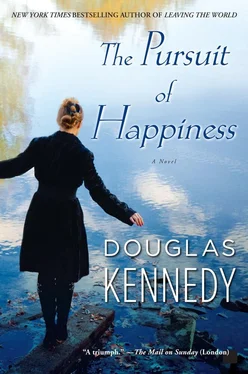'That must have been awful'.
He rubbed his thumb and forefinger together.
'This is the world's smallest violin'.
'So you're all alone in the world?'
'No, there's a kid sister, Meg. She's the real brains of the family: a senior now at Barnard. Full scholarship too. Pretty damn impressive for someone from a family of ignorant micks'.
'Didn't you go to college too?'
'No - I went to the Brooklyn Eagle. They took me on as a copy boy right after high school. And I was a junior reporter there by the time I enlisted. That's how I found my way on to Stars and Stripes. End of story'.
'Oh, come on. You're not going to stop there, are you?'
'I'm not that interesting'.
'I smell a whiff of false modesty - and I don't buy it. Everyone's got a story to tell. Even guys from Brooklyn'.
'You really want a long story?'
'Absolutely'.
'A war story?'
'If it's about you'.
He reached for his cigarettes, and lit one up.
'For the first two years of the war, I was behind a desk at the Stars and Stripes office in Washington. I begged for an overseas transfer. So they sent me to London - and a desk job covering stuff in Allied HQ. I kept screaming to be sent out into the field, but I was told I'd have to wait my turn. So I missed the Normandy landings, and the liberation of Paris, and the fall of Berlin, and us Yanks liberating Italy, and all those big sexy stories which went to the paper's senior writers - college guys mainly; all second lieutenants upwards. But, after a lot of wangling, I did get myself attached to the Seventh Army, as they marched into Munich. It was a real eye-opener. Because as soon as we arrived there, a battalion was dispatched to a village about eight miles outside of the city. I decided to go along for the ride. The village was called Dachau. The mission was a simple one: to liberate a penal camp there. The town of Dachau was actually rather sweet. It hadn't taken too many hits from our Air Force or the RAF, so the center of the village was pretty much intact. Nice gingerbready houses. Well-tended gardens. Clean streets. And then, this camp. Have you read anything about that camp?'
'Yes. I have'.
'I tell you, every member of the battalion went silent as soon as they'd marched through the gates. They'd expected to meet armed resistance from the camp guards - but the last of them had fled just twenty minutes before we showed up. And what they... we... found...'
He paused for a moment, as if censoring himself.
'What we found was... unspeakable. Because it defied description. Or comprehension. Or simple basic human reason. It was so evil - such an outrage - that it actually seemed unreal... to the point where even talking about it now almost cheapens it...
'Anyway, around an hour after we marched into the camp, the order came from Allied HQ to round up every adult resident of Dachau. The company's captain - a real hard-assed Southern boy named Dupree from New Orleans - gave the job to two sergeants. I'd only spent a few hours with this battalion, but had already reached the conclusion that Dupree was the world's biggest loudmouth - a graduate of The Citadel ('The Confederate West Point', as he kept reminding us Yankees), and the original Mr Gung Ho. But after taking an inspection tour of Dachau, he was the color of chalk. And his voice just about made it to a whisper.
'"Take four men each," he told the sergeants, "and knock on every door of every house and shop in the village. Everyone over the age of sixteen - men and women, no exceptions - is to be ordered into the street. Once you have rounded up every adult resident of Dachau, I want them marched up here in a perfectly ordered single line. Is that clear, gentlemen?"
'One sergeant raised his hand. Dupree nodded for him to speak.
'"Say they show any resistance, sir?" he asked.
'His eyes narrowed. "Make certain they don't, Davis - by whatever means necessary."
'But none of the good people of Dachau resisted the US Army. When our boys showed up at their front door, they all came out meekly - hands above or behind their heads, a few of the women gesturing wildly towards their children, pleading in a language they didn't understand... although it was pretty damn clear what they thought we might do. One young mother - she couldn't have been more than seventeen, with a tiny infant in her arms - saw my uniform and my gun, and literally fell at my feet, screaming in horror. I tried to reason with her, saying over and over again, " We're not going to hurt you... we're not going to hurt you"... but she was hysterical. Who could blame her? Eventually, an older woman in the line grabbed hold of her, slapped her hard on the face, then whispered fiercely into her ear. The young woman struggled to calm down - and clutching her baby to her chest, she joined the line, sobbing quietly. The older woman then looked towards me with fearful respect, giving me a submissive nod, as if to say: She's under control now. Please don't do us harm.
' Harm you! Harm you! I felt like shouting. We're Americans. We're the good guys here. We are not you.
'But I said nothing. I just curtly nodded back, and returned to my observer status.
'It took nearly an hour to round up every adult present in Dachau. There must have been over four hundred people in that line. As they began the slow march toward the camp, many of them began to weep. Because I'm certain they thought they were going to be shot.
'It was only a ten-minute walk from the middle of town to the gates of the camp. Ten minutes. Maybe half-a-mile at most. Ten minutes separating this cozy little village - where everything was neat and tidy and so damn manicured - from an atrocity. That's what made Dachau about ten times even more extraordinary and terrible: the knowledge that normal life was going on just a half-mile down the street.
'When we got to the gates of the camp, Captain Dupree was waiting for us.
'"What do you want us to do with the townspeople, sir?" Sergeant Davis asked him.
'"Just march them through the camp. The entire camp. That's the order from Allied Command - rumor has it, from Ike himself. They're to see everything. Spare 'em nothing."
'"And after they've seen the camp, sir?"
'"Let' em go."
'They did as ordered. They marched those four hundred townspeople through every damn corner of the camp. The barracks, with human waste piled up on the floors. The ovens. The dissecting tables. The mountain of bones and skulls piled up right near the crematorium. As they took them on this guided tour, the camp survivors - there must have been a couple of hundred of them - stood silently in the courtyard. Most of them were so emaciated they looked like the walking dead. I tell you, not one of the townspeople looked a survivor in the face. In fact, most of them kept their eyes fixed firmly on the ground. They were just as silent as the survivors.
'But then, this one guy lost it. He was a well-dressed, well-fed banker type. He must have been in his late fifties: good suit, well-polished shoes, gold watch in his vest pocket. Out of nowhere, he suddenly started to cry. Uncontrollably. The next thing we knew, he broke out of the line, and went staggering towards Captain Dupree. Immediately, two of our guys had their guns drawn. But Dupree waved them away. The banker type fell to his knees in front of the Captain, sobbing wildly. And he kept saying this one thing over and over again. He said it so much I remembered it:
'"Ich habe nichts davon gewufsst... Ich habe nichts davon gewusst... Ich habe nichts davon gewusst."
'Dupree looked down at him, really puzzled. Then he called for Garrison - the translator who'd been assigned to our battalion. He was this shy, bookish type, who never looked directly at anyone. He stood by the Captain and stared wide-eyed at the weeping banker.
Читать дальше












